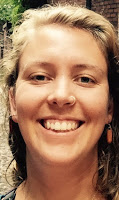
Last week a friend brought us supper, and sat and ate with us while our 14 month old Leona shrieked (because she doesn’t yet have words to tell us what she wants/needs) and cried (because molars hurt). After my husband biked off to his Buddhist sangha gathering, my friend (who does not have children) said, “I’ve been learning recently about how common postpartum depression and anxiety is. I’m sorry I didn’t ask you about your postpartum mental health before this. But how has that been for you?”
I almost cried with relief and gratitude for the question. We talked about the intense hormonal swings of the postpartum days and weeks, and I told her that I feel lucky, because while I’ve had some familiar anxiety and depression, it hasn’t been anything that has felt unusual or unmanageable. I do plenty of questioning myself and my parenting, but most days I get through that, too. But I told her I was so glad she asked.
I’ve written about postpartum depression here before. And part of me worries that I shouldn’t be writing about it again. But in the last week I’ve heard of one mom who just finished several weeks in the hospital for postpartum depression, and another one who just got diagnosed. I’ve also talked to a mom at the Montessori school where Leona will start in a few months who is going back to work soon, as a maternal mental health therapist. Plus, I listened to this podcast series, which is also trying to stigma-bust around maternal and postpartum mental health issues.
All of these moments help to remind me: postpartum mental health is something that warrants a lot of conversation. There’s still immense shame around it, as there often is with mental health in general. And as I cook a meal today to bring to new parents, I’ve been wondering about ways that church communities can do better here. I know from my own experience that it was lovely having people from our churches in Wisconsin drop off meals in the weeks after Leona was born. But on the hard days, it was hard to also read the accompanying notes about how wonderful and magical parenthood is.
What if when we drop off a casserole or pasta salad we leave a note that talks about how we know that these early days can be both magical and some of the most difficult? What if we mention that we know postpartum mental health can be challenging, and if they want to talk we’re available? What if we make sure churches have resources on good maternal mental health therapists, and make sure that if clergy are visiting new parents they also talk about how sometimes therapists can be helpful (and necessary!)? What if?

Hannah Campbell Gustafson
Hannah Campbell Gustafson and her family recently made a leap of faith and moved to Minneapolis, MN from rural Wisconsin. She is the outreach coordinator at Plymouth Congregational Church. Hannah is treasurer for the Mental Health Network, is trained as a social worker, has an MDiv, and is a Member in Discernment with the Southwest Association of the Wisconsin Conference of the UCC. She and her partner (an ELCA Lutheran pastor) share their lives with their young child Leona and their standard poodle puppy Óscar.